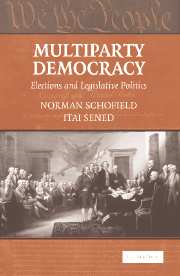Book contents
- Frontmatter
- Contents
- List of Tables and Figures
- Preface
- 1 Multiparty Democracy
- 2 Elections and Democracy
- 3 A Theory of Political Competition
- 4 Elections in Israel, 1988–1996
- 5 Elections in Italy, 1992–1996
- 6 Elections in the Netherlands, 1979–1981
- 7 Elections in Britain, 1979–2005
- 8 Political Realignments in the United States
- 9 Concluding Remarks
- References
- Index
- POLITICAL ECONOMY OF INSTITUTIONS AND DECISIONS
2 - Elections and Democracy
Published online by Cambridge University Press: 06 July 2010
- Frontmatter
- Contents
- List of Tables and Figures
- Preface
- 1 Multiparty Democracy
- 2 Elections and Democracy
- 3 A Theory of Political Competition
- 4 Elections in Israel, 1988–1996
- 5 Elections in Italy, 1992–1996
- 6 Elections in the Netherlands, 1979–1981
- 7 Elections in Britain, 1979–2005
- 8 Political Realignments in the United States
- 9 Concluding Remarks
- References
- Index
- POLITICAL ECONOMY OF INSTITUTIONS AND DECISIONS
Summary
ELECTORAL COMPETITION
[I]t may be concluded that a pure democracy, by which I mean a society, consisting of a small number of citizens, who assemble and administer the government in person, can admit of no cure for the mischiefs of faction. … Hence it is that such democracies have ever been spectacles of turbulence and contention; have ever been found incompatible with personal security … and have in general been as short in their lives as they have been violent in their deaths.
A republic, by which I mean a government in which the scheme of representation takes place, opens a different prospect. …
[I]f the proportion of fit characters be not less in the large than in the small republic, the former will present a greater option, and consequently a greater probability of a fit choice.
(Madison, 1787).It was James Madison's hope that the voters in the Republic would base their choices on judgments about the fitness of the Chief Magistrate. Madison's argument to this effect in Federalist 10 may very well have been influenced by a book published by Condorcet in Paris in 1785, extracts of which were sent by Jefferson from France with other materials to help Madison in his deliberation about the proper form of government. While Madison and Hamilton agreed about the necessity of leadership in the Republic, there was also reason to fear the exercise of tyranny by the Chief Magistrate as well as the turbulence or mutability of decision making both in a direct democracy and in the legislature.
- Type
- Chapter
- Information
- Multiparty DemocracyElections and Legislative Politics, pp. 11 - 36Publisher: Cambridge University PressPrint publication year: 2006

